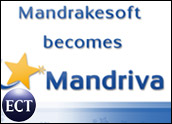
Linux lovers can rejoice this week as two new distributions of the open-source platform make their way to the market.
Mandriva released the latest version of its Linux product, Mandriva 2006, yesterday, and Canonical launched its latest Linux version, Ubuntu 5.0, today. Analysts said both companies are offering interesting propositions for their respective target markets.
Made-Over Mandriva
In its first updated distribution since the company was known as Mandrakesoft, Mandriva 2006 merges technologies from Conectiva and Lycoris, two companies it acquired earlier this year. Mandriva 2006 comes in three editions. Discovery/Lx is targeted at the Linux beginner. PowerPack and PowerPack+ aims at SOHO users.
“Mandriva was already widely recognized as providing the ultimate in Linux. The merger with Conectiva’s and Lycoris’ technologies has strengthened that asset. Our 2006 edition offers many features today’s users are looking for in an operating system,” said Francois Bancilhon, Mandriva CEO. “2006 integrates technologies from leading companies such as Intel and Skype. “
Man-Made Innovations
New to Mandriva 2006 are the Kat desktop search tool and the interactive firewall. Kat allows users to track down information in files names and in the content of the files. The interactive firewall lets users get real-time information on any malicious actions being performed against their system.
Mandriva 2006 integrates OpenOffice.org, Mozilla Firefox for Web browsing, Kopete for chat, Kontact for e-mail management and Skype for voice calling over Internet functions. Mandriva 2006 also provides support for Intel Centrino mobile technology and offers new server tools.
Pund-IT Principal Analyst Charles King told LinuxInsider that focusing on interoperability with Centrino and Skype are both strategies that could pay off for the growing Linux distributor. However, King said the company’s small business target might not play out as well as the company hopes.
“The SMB market is a good space for Mandriva to focus one because its products are very reasonably priced, which makes them attractive. But I am not sure the price alone is going to be enough,” King said. “Small businesses have been a tough play for Linux because it’s simply easier for them to go with software that comes with a disk, an installation wizard, and support.”
A Utopian Vision
Meanwhile Canonical has released the latest version of Ubuntu targeting consumers looking for a user-friendly desktop. Unlike Mandriva, which costs about US$35 for the basic version, Ubuntu is available free of charge.
This release features a new flavor of Ubuntu, called Edubuntu, a specialized version developed in collaboration with teachers and education specialists for classroom deployment.
The company said a major feature of Ubuntu 5.10 is the built-in thin client functionality — produced in cooperation with the Linux Terminal Server Project — that makes the software particularly advantageous in schools and for businesses with older hardware or who are looking to reduce total cost of ownership through effective Linux deployments.
King said the fact that the company is focusing on thin client functionality is interesting because that is an area that could see growing demand for developing countries. But that’s a long-term play.
In the short term, King has concerns. “I’ve been looking at the Linux community for long enough and have seem similar sorts of Utopian goals expressed in the past,” King said. “They sound great on paper, but at the end of the day my usual question is, how are these guys going to make a living?”




















































